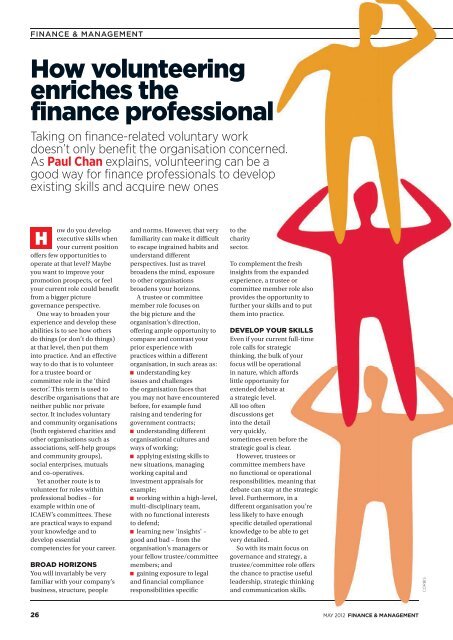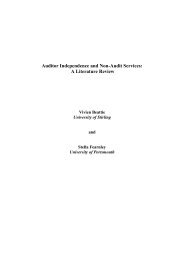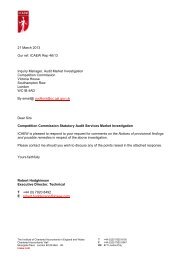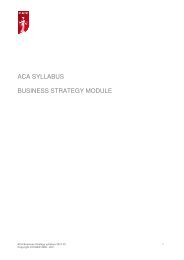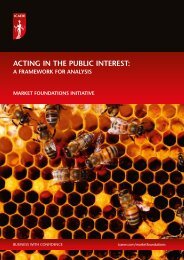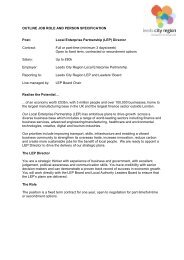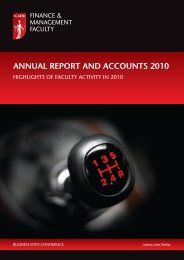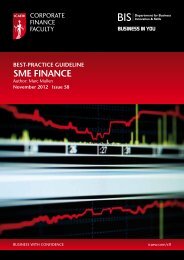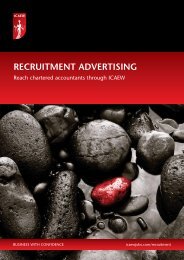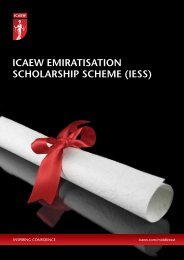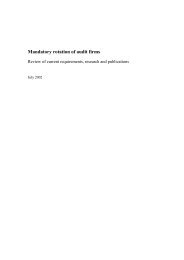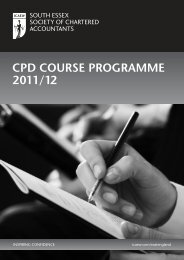Hit the road Positive leadership for troubled times - ICAEW
Hit the road Positive leadership for troubled times - ICAEW
Hit the road Positive leadership for troubled times - ICAEW
Create successful ePaper yourself
Turn your PDF publications into a flip-book with our unique Google optimized e-Paper software.
FINANCE & MANAGEMENT<br />
How volunteering<br />
enriches <strong>the</strong><br />
finance professional<br />
Taking on finance-related voluntary work<br />
doesn’t only benefit <strong>the</strong> organisation concerned.<br />
As Paul Chan explains, volunteering can be a<br />
good way <strong>for</strong> finance professionals to develop<br />
existing skills and acquire new ones<br />
H<br />
ow do you develop<br />
executive skills when<br />
your current position<br />
offers few opportunities to<br />
operate at that level? Maybe<br />
you want to improve your<br />
promotion prospects, or feel<br />
your current role could benefit<br />
from a bigger picture<br />
governance perspective.<br />
One way to b<strong>road</strong>en your<br />
experience and develop <strong>the</strong>se<br />
abilities is to see how o<strong>the</strong>rs<br />
do things (or don’t do things)<br />
at that level, <strong>the</strong>n put <strong>the</strong>m<br />
into practice. And an effective<br />
way to do that is to volunteer<br />
<strong>for</strong> a trustee board or<br />
committee role in <strong>the</strong> ‘third<br />
sector’. This term is used to<br />
describe organisations that are<br />
nei<strong>the</strong>r public nor private<br />
sector. It includes voluntary<br />
and community organisations<br />
(both registered charities and<br />
o<strong>the</strong>r organisations such as<br />
associations, self-help groups<br />
and community groups),<br />
social enterprises, mutuals<br />
and co-operatives.<br />
Yet ano<strong>the</strong>r route is to<br />
volunteer <strong>for</strong> roles within<br />
professional bodies – <strong>for</strong><br />
example within one of<br />
<strong>ICAEW</strong>’s committees. These<br />
are practical ways to expand<br />
your knowledge and to<br />
develop essential<br />
competencies <strong>for</strong> your career.<br />
BROAD HORIZONS<br />
You will invariably be very<br />
familiar with your company’s<br />
business, structure, people<br />
and norms. However, that very<br />
familiarity can make it difficult<br />
to escape ingrained habits and<br />
understand different<br />
perspectives. Just as travel<br />
b<strong>road</strong>ens <strong>the</strong> mind, exposure<br />
to o<strong>the</strong>r organisations<br />
b<strong>road</strong>ens your horizons.<br />
A trustee or committee<br />
member role focuses on<br />
<strong>the</strong> big picture and <strong>the</strong><br />
organisation’s direction,<br />
offering ample opportunity to<br />
compare and contrast your<br />
prior experience with<br />
practices within a different<br />
organisation, in such areas as:<br />
understanding key<br />
issues and challenges<br />
<strong>the</strong> organisation faces that<br />
you may not have encountered<br />
be<strong>for</strong>e, <strong>for</strong> example fund<br />
raising and tendering <strong>for</strong><br />
government contracts;<br />
understanding different<br />
organisational cultures and<br />
ways of working;<br />
applying existing skills to<br />
new situations, managing<br />
working capital and<br />
investment appraisals <strong>for</strong><br />
example;<br />
working within a high-level,<br />
multi-disciplinary team,<br />
with no functional interests<br />
to defend;<br />
learning new ‘insights’ –<br />
good and bad – from <strong>the</strong><br />
organisation’s managers or<br />
your fellow trustee/committee<br />
members; and<br />
gaining exposure to legal<br />
and financial compliance<br />
responsibilities specific<br />
to <strong>the</strong><br />
charity<br />
sector.<br />
To complement <strong>the</strong> fresh<br />
insights from <strong>the</strong> expanded<br />
experience, a trustee or<br />
committee member role also<br />
provides <strong>the</strong> opportunity to<br />
fur<strong>the</strong>r your skills and to put<br />
<strong>the</strong>m into practice.<br />
DEVELOP YOUR SKILLS<br />
Even if your current full-time<br />
role calls <strong>for</strong> strategic<br />
thinking, <strong>the</strong> bulk of your<br />
focus will be operational<br />
in nature, which af<strong>for</strong>ds<br />
little opportunity <strong>for</strong><br />
extended debate at<br />
a strategic level.<br />
All too often<br />
discussions get<br />
into <strong>the</strong> detail<br />
very quickly,<br />
some<strong>times</strong> even be<strong>for</strong>e <strong>the</strong><br />
strategic goal is clear.<br />
However, trustees or<br />
committee members have<br />
no functional or operational<br />
responsibilities, meaning that<br />
debate can stay at <strong>the</strong> strategic<br />
level. Fur<strong>the</strong>rmore, in a<br />
different organisation you’re<br />
less likely to have enough<br />
specific detailed operational<br />
knowledge to be able to get<br />
very detailed.<br />
So with its main focus on<br />
governance and strategy, a<br />
trustee/committee role offers<br />
<strong>the</strong> chance to practise useful<br />
<strong>leadership</strong>, strategic thinking<br />
and communication skills.<br />
CORBIS<br />
26<br />
MAY 2012 FINANCE & MANAGEMENT


